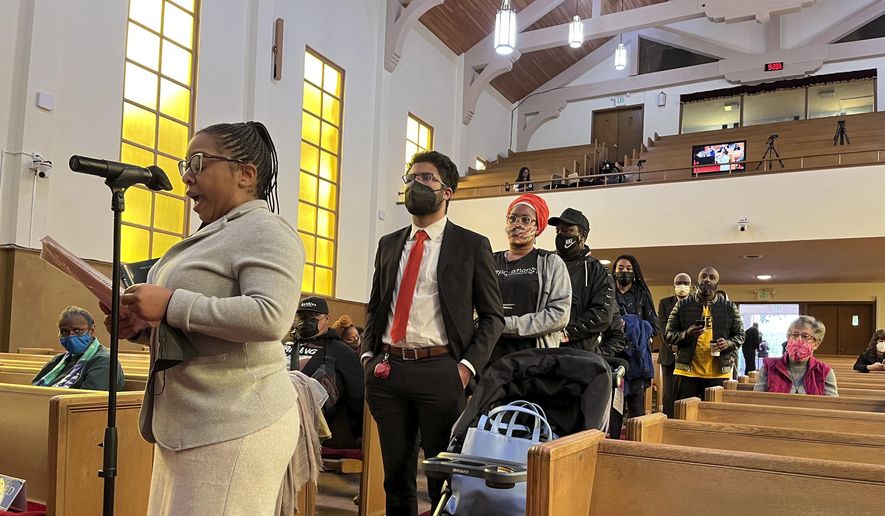OPINION:
Section 1 of the 14th Amendment to the Constitution provides in part: “No state shall deny to any person within its jurisdiction the equal protection of the laws.”
The 14th Amendment was ratified in 1868 in the wake of the Civil War, and Section 1 was specifically designed to ensure that states would not be able to discriminate against Black people, many of whom were recently freed slaves. Its final clause — “nor deny any person within its jurisdiction the equal protection of the laws” (the equal protection clause) — essentially prohibits the states from treating any citizen differently from any other citizen.
So it is a bit ironic that San Francisco’s African American Reparations Advisory Committee recently proposed that the city pay $5 million each to virtually all Black San Francisco residents over the age of 18, pay off educational and other debts, provide an annual payment, and pay reparations to Black people all over the country with drug convictions.
Such reparations are probably contrary to the equal protection clause because they — obviously — prefer one group of citizens over another. The cash would not be available to non-Black people under any set of circumstances. Asians, Hispanics and White people — even those fortunate enough to have drug convictions — would receive no money.
Even members of other minority groups who may have suffered racial or ethnic discrimination historically comparable to that of Black people in San Francisco would not be eligible for the money.
Members of Indian tribes, who were literally hunted for scalps, reduced to de facto slavery and barred from the courts, would receive no reparations.
Chinese Americans and Japanese Americans were barred from testifying in court, and for nearly four decades in the 20th century (1913-1952), Japanese Americans were legally prevented from owning land and property in more than a dozen states. More than 120,000 Japanese Americans were interned during World War II, many in California. Many left behind businesses and property.
They would receive no reparations.
There would also be no reparations — nor should there be — for those who are not Black or not descendants of Black people in San Francisco but whose ancestors may have been damaged by government policies. Think the leveling of neighborhoods for highways, or zoning, or lousy schools, or excessive crime, or any of the dozens of ways large and small that governments damage people.
A focus on reparations is not healthy for the body politic. All of us either are or are descended from victims of something stupid or evil that the government has done or allowed. That doesn’t entitle any of us to pick the pocket of another citizen.
Californians themselves understand this. In Proposition 209, California voters specifically precluded government institutions from engaging in affirmative action on the basis of race, sex or ethnicity.
The $5 million-per-person reparations payment may not violate Proposition 209, however, which bans affirmative action only in public education, government contracting and government employment. At first glance, only the part of the reparations plan that pays off the educational debts of Black people appears to violate Proposition 209.
It may not make much of a difference, since the plan as proposed would probably bankrupt San Francisco immediately.
As The Washington Times reports, “The city’s reparations committee has recommended giving each Black person who meets the criteria a lump-sum payment of $5 million, along with a guaranteed income of $97,000 for at least 250 years and paying off all educational and personal debts.” The estimated cost of the lump-sum payments alone would be $225 billion, swamping the city’s $14 billion annual budget.
Finally, and mercifully, the whole mess might be found unconstitutional by the current courts. For a racial preference to be legal, it has to remedy government discrimination, not “societal discrimination,” according to the Supreme Court’s Croson decision. The discrimination being remedied also has to be recent, not in the distant past — courts think something like 14 or 18 years ago is the distant past — according to federal appeals courts in cases such as Brunet v. City of Columbus (1993).
Moreover, the reparations plan has an unconstitutional purpose, because it is not actually intended as a remedy for discrimination by the city. Most people who would receive reparations have no connection to San Francisco and would qualify for reparations based on drug convictions, an area where the city is not even accused of singling out Black people.
In short, the reparations committee’s proposals probably would be declared unconstitutional. But the composition of the judiciary is always changing, and it is easy to imagine that a more left-leaning Supreme Court might eventually uphold some reparations.
• Hans Bader is a lawyer who specializes in civil rights. He helped successfully defend Proposition 209 — which banned racial preferences in hiring, government contracts and education — in California.




Please read our comment policy before commenting.